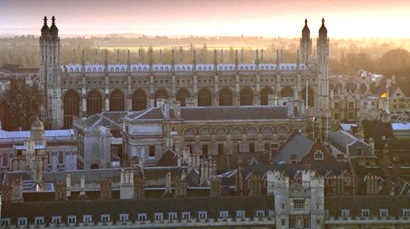 The University of Cambridge (informally Cambridge University), located in the City of Cambridge, Cambridgeshire, United Kingdom, is the second oldest university in the English-speaking world and the fourth oldest in Europe. Roger of Wendover wrote shortly after its foundation that the University of Cambridge could trace its origins to a crime committed in 1209.
The University of Cambridge (informally Cambridge University), located in the City of Cambridge, Cambridgeshire, United Kingdom, is the second oldest university in the English-speaking world and the fourth oldest in Europe. Roger of Wendover wrote shortly after its foundation that the University of Cambridge could trace its origins to a crime committed in 1209.
Although not always a reliable source, the detail given in his contemporaneous writings lends them credence. Two Oxford scholars were convicted of the murder or manslaughter of a woman and were hanged by the town authorities with the assent of the King. In protest at the hanging, the University of Oxford went into voluntary suspension, and scholars migrated to a number of other locations, including the pre-existing school at Cambridge (Cambridge had been recorded as a “school” rather than university when John Grim held the office of Master there in 1201). These exile Oxford scholars (post-graduate researchers by present day terminology) started Cambridge’s life as a university in 1209.
Academically, Cambridge is consistently ranked in the world's top five universities and as the best university in Europe in the annual ranking by Shanghai Jiao Tong University.
It was ranked as the best University in both the United Kingdom and in Europe in the 2008 Times Higher Education-QS World University Rankings, and 2nd best university in the world in the 2009 rankings. The University's alumni include 85 Nobel Laureates as of 2009[update].
| Established : | c. 1209 |
| Type: | Public |
| Chancellor : | HRH The Duke of Edinburgh |
| Vice-Chancellor: | Alison Richard |
| Staff : | 8,614 |
| Students: | 18,396 |
| Undergraduates : | 12,018 |
| Postgraduates: | 6,378 |
| Location: | Cambridge, England, UK |
| Affiliations: | Russell Group, Coimbra Group, EUA, LERU, IARU |
| Website: | http://www.cam.ac.uk |
Colleges
All students and many of the academics are attached to colleges, where they live, eat and socialise. It is also the place where students may receive their small group teaching sessions, known as supervisions. Each college appoints its own teaching staff and fellows in each subject; decides which students to admit, in accordance with university regulations; provides small group teaching sessions, for undergraduates (though lectures are arranged and degrees are awarded by the university); and is responsible for the domestic arrangements and welfare of its own undergraduates, graduates, post-doctoral researchers, and staff in general.
The University of Cambridge has 31 colleges. These colleges are the primary source of accommodation for undergraduates and graduates at the University and at the undergraduate level have responsibility for admitting students and organising their tuition. They also provide funding and/or accommodation for some of the senior research posts in the University.
Schools, faculties and departments
In addition to the 31 colleges, the university is made up of over 150 departments, faculties, schools, syndicates and other institutions. Members of these are usually also members of one (or more) of the colleges and responsibility for running the entire academic programme of the university is divided amongst them.
A 'school' in the University of Cambridge is a broad administrative grouping of related subjects, each covering a specified group of faculties. Each has an elected supervisory body—The Council of the School—comprising representatives of the constituent faculties and departments in each school. There are six schools:
* Arts and Humanities
* Biological Sciences, including Veterinary Medicine
* Clinical Medicine
* Humanities and Social Sciences
* Physical Sciences
* Technology
Teaching and research in Cambridge is organised by Faculties. The Faculties have different organisational sub-structures which partly reflect their history and partly their operational needs, which may include a number of Departments and other institutions. In addition, a small number of bodies entitled Syndicates have responsibilities for teaching and research, exercising powers similar in effect to those of Faculty Boards. Examples are Cambridge Assessment, the University Press, and the University Library.